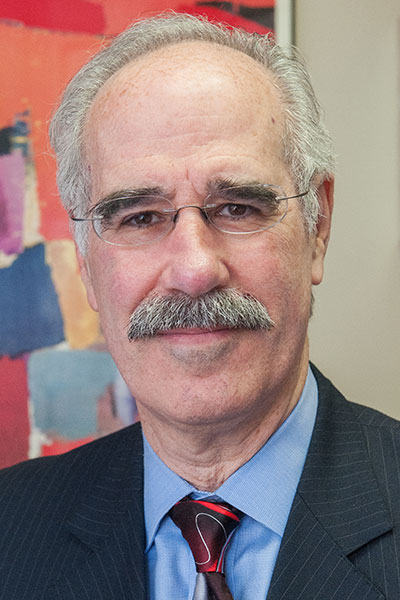
Nathan, MD
The Diabetes Control and Complications Trial (DCCT) and the follow-up Epidemiology of Diabetes Interventions and Complications (EDIC) study have shaped the way type 1 diabetes has been viewed and treated since the first results were reported in 1993 after a 10-year clinical trial. Nearly every form of insulin in use today, every insulin pump, continuous glucose monitor (CGM), treatment guideline, and recommendation establishing the standard of care for type 1 diabetes have their roots in the DCCT/EDIC.
“When the DCCT started 40 years ago, blood sugar control in patients with type 1 diabetes was, I don’t want to say abominable, but really not good,” said David M. Nathan, MD, one of the original DCCT investigators. He is now Head of the DCCT/EDIC Research Group and Director of the Massachusetts General Hospital Diabetes Center and Clinical Research Center.
Dr. Nathan will open The Ongoing Impact of the DCCT/EDIC Study at 40 Years on Sunday, June 25, at 4:30 p.m. PT in Ballroom 20D of the San Diego Convention Center.
“The tools we had were so very limited—just three types of insulin and large, bulky pumps,” he said. “The frequency of complications, of patients losing their vision, going on to kidney failure, and dying early, was just horrible. It needed to be addressed.”
The prospective DCCT was launched in 1982 to test the glucose hypothesis of type 1 diabetes and determine whether complications could be prevented or delayed using intensive glucose management aimed at normalizing glucose levels versus standard of care. The trial randomized 1,441 patients with type 1 diabetes and stopped a year early due to efficacy.
The observational EDIC, launched when DCCT ended, continues to follow more than 1,000 original DCCT participants to assess the lifetime impact of early glucose control in type 1 diabetes.

RN, CDCES
“DCCT demonstrated without a doubt that you could employ intensive insulin therapy and that intensive therapy was beneficial to people with type 1 diabetes in terms of delaying the development and slowing the progression of long-term complications,” said Gayle Lorenzi, RN, CDCES, who manages the San Diego DCCT/EDIC site.
“DCCT ended the long-standing scientific controversy about the importance of glucose control and was hugely important in pushing the health care community to accept that it matters to control glucose,” she explained. “Importantly, DCCT also demonstrated that it takes more than just the doc in the white coat to manage diabetes. It takes a multidisciplinary team. Our management encouraged treating the individual as someone who happens to have diabetes, not to be a ‘diabetic.’ Diabetes care has changed dramatically and would not have evolved as quickly as it has without the DCCT results. Insurance, pharmaceutical, and technology companies would not have been as motivated to jump on board without the clear scientific evidence that glucose matters.”
Ms. Lorenzi and Catherine Martin, MS, RN, Adjunct Clinical Instructor, University of Michigan School of Nursing, will discuss the functional impact of long-standing type 1 diabetes on cognition, physical function, hearing, and skeletal health.
ADA President for Medicine and Science Rodica Busui, MD, PhD, the Larry D. Soderquist Professor in Diabetes, Professor of Metabolism, Endocrinology and Diabetes, University of Michigan, and Bruce Perkins, MD, MPH, Professor of Medicine, University of Toronto, Canada, will review how DCCT/EDIC changed the care of type 1 diabetes.
Every element in the current standards of care for people with type 1 diabetes can be traced back to findings from DCCT, EDIC, or both, said Dr. Busui, who has been an EDIC co-investigator for almost 20 years. The long-term impact of DCCT/EDIC is due in large part to the unprecedented follow-up.

“This study is the only one that I’m aware of in the history of human trials in which more than 90% of the original cohort came back to share their health status and continue to participate in new studies assessing the entire type 1 diabetes lifespan every year for 40 years,” Dr. Busui said. “They, the participants, are giving us the opportunity to learn so much more about diabetes in general, and the natural history, traditional and newer complications, and impact of type 1.”
DCCT is credited with the proliferation of life-saving technologies that are now available for people living with the disease, including CGMs and automatic insulin delivery systems that integrate CGM and pump technologies.
“There are so many people who are alive today living well with type 1 diabetes around the globe instead of dying from it because of DCCT and EDIC findings,” Dr. Busui said.
Principal Investigator Barbara H. Braffett, PhD, Associate Research Professor, Milken Institute School of Public Health, George Washington University, leads the DCCT/EDIC Data Coordinating Center, and will address what EDIC can still contribute and future directions for this research.
Rose Gubitosi-Klug, MD, PhD, will discuss the amelioration of microvascular complications and their major risk factors in DCCT/EDIC. She is a Professor of Medicine, Case Western Reserve University, Division Chief of Pediatric Endocrinology, Diabetes and Metabolism, University Hospitals (UH) Rainbow Babies and Children’s Hospital, and Division Chief, Pediatric Endocrinology, UH Cleveland Medical Center.
Ionut Bebu, PhD, Associate Research Professor of Biostatistics and Bioinformatics, The George Washington University, will review cardiovascular disease in type 1 diabetes.
Bruce A. Perkins, MD, MPH, Professor of Medicine, Division of Endocrinology and Metabolism, and Institute of Health Policy, Management and Evaluation, University of Toronto, Canada, will offer a clinical perspective on how DCCT/EDIC changed the care of people living with type 1 diabetes.